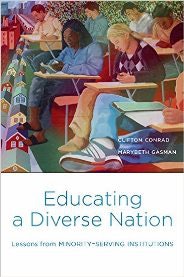When it comes to examining best practices within higher education, majority institutions should take a look at work being done at many of the nation’s minority-serving institutions.
That’s the recommendation of the authors of a new book, Educating a Diverse Nation (Harvard University Press), published by Drs. Marybeth Gasman and Clifton Conrad.
The authors studied 12 MSIs around the country and found new approaches to culturally relevant learning and real-world problem solving as they documented how faculty, staff and students often operate like a close-knit family.
 Drs. Marybeth Gasman and Clifton Conrad’s new book.
Drs. Marybeth Gasman and Clifton Conrad’s new book.The book also documents the personal stories of MSI students about their preparation for college, the relevance of higher education in their lives and the challenge of financing a college education—often as a first-generation student.
“We too often in higher education embrace the one size fits all view,” says Conrad, the Vilas Distinguished Achievement Professor of Higher Education at the University of Wisconsin-Madison. “The challenges that many students at Minority Serving Institutions face are very diverse. It isn’t just about money or being non-native speakers. But it’s some of the more invisible challenges and the intersection of these challenges that are not often discussed.”
The book, which was published in April, has already received widespread attention in the world of higher education.
“This book gives us a compelling narrative, filled with robust research, facts and recommendations to help colleges and universities better educate the growing population of Americans who will comprise the majority of college students in the decades ahead,” says Dr. Martha Kanter, the former U.S. Under Secretary of Education who now teaches at New York University.
The authors focused their study on four types of MSIs—Historically Black Colleges and Universities (HBCUs), Tribal Colleges and Universities (TCUs), Hispanic-Serving Institutions (HSIs), and Asian American and Native American Pacific Islander–Serving institutions (AANAPISIs)—to identify strategies for empowering nontraditional students to succeed in college despite the unique obstacles they face.
According to the authors, 3.6 million undergraduate students—20 percent of all undergraduates in the U.S.—enroll in MSIs. While HSIs represent only 6 percent of post-secondary institutions, they enroll nearly 50 percent of all Latino students. AANAPISIs represent less than 1 percent of all colleges and universities, yet they enroll nearly 27 percent of all Asian Americans and Pacific Islanders.
While HBCUs represent just 3 percent of all colleges and universities, they enroll 8 percent of African-American students. TCUs represent less than1 percent of higher education institutions yet enroll almost 10 percent of Native American students.
Gasman, who is a professor of higher education and director of the Center for Minority Serving Institutions at the University of Pennsylvania, says that predominantly White institutions have historically been condescending when interacting with MSIs.
“All too often people talk about minority institutions with the idea of, ‘Here is what you can learn from us. We know everything. Here is how you should do it,” says Gasman. “But we can learn from each other, and there is a tremendous amount that MSIs can teach us, particularly right now as the nation’s demographics are changing.”
A qualitative study, Gasman and Conrad spent time on the campuses of MSIs interviewing faculty, staff and students.
“We poured our hearts and souls into this,” says Gasman. “I saw people really loving their students. We uncovered this incredible love among faculty, staff and students and that’s not necessarily what students get at majority institutions. Now, imagine if students of color would say this about majority institutions. Wouldn’t it be a great thing?”
Jamal Eric Watson can be reached at [email protected]. You can follow him on twitter @jamalericwatson


















